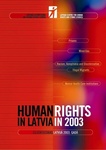Human Rights in Latvia in 2003
For Latvia, 2003 was the last year before accession to the European Union and NATO, which determined much of the policy focus of the country. Although pre-accession largely prioritized areas other than human rights, several international recommendations by the United Nations Committees and Council of Europe representatives helped to focus attention on the main human rights problems those in closed institutions. In addition to the problems in prisons (pre-trial detention, conditions and procedures), mental health institutions and the illegal migrants camp, attention was also focused on the issues of police brutality and the lack of independent complaints institutions.
At the same time, the citizenship issue remained unresolved, with only slow progress in the rate of naturalization and a status quo or even some signs of regression concerning the rights of non-citizens. Minority rights concerns remained much the same as in previous years including the non-ratification of the Council or Europe Framework Convention for the Protection of National Minorities.
Tension over the minority education reform increased throughout the year. New and worrisome developments include legislative and policy proposals that would possibly infringe upon freedom of assembly. Lack of awareness of intolerance issues and public responsibility became apparent when several high-profile politicians provided interviews to national extremist publication associated with both anti-Semitism and homophobia.
The political context in the country saw some changes over the year. The coalition government consisted of four parties the prime ministers New Era (27 mandates), Latvias First Party (9), the Union of Greens and Farmers (12) and Fatherland and Freedom/Latvian National Independence Movement (7). Although the closest partnership was initially announced by the first two, gradually tensions between them led to an open rift around the time of the EU referendum, 20 September.
Meanwhile, the parliamentary left opposition also had its crises. The coalition For Human Rights in a United Latvia, which consisted of the Peoples Harmony Party, the party Equality and the Socialist Party, broke up in the second half of February, when the Peoples Harmony Party left the coalition. While the Peoples Harmony Party announced its intentions of establishing itself as a West European style social democratic party and clearly announced its pro- European Union stance, more radical members of the union remained together until June, when the Latvian Socialist Party established its own faction with 5 deputies. In September, the remaining unaffiliated former FHRUL deputies and one Peoples Harmony Party member registered a new, more radical For Human Rights in United Latvia, with 6 members. The crisis within the People’s Harmony Party continued, and at the end of the year, although the parliamentary faction still retained 9 members, some important non-parliamentary members left the party.
The People’s Party, which had participated in several governments before, remained stable in its opposition position, with 20 deputies.
Attachments
Published: 2004-11-16
